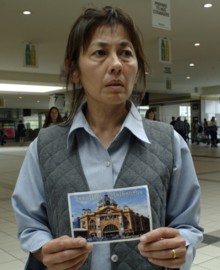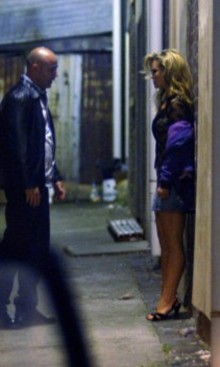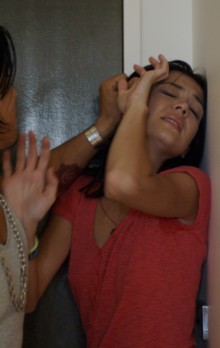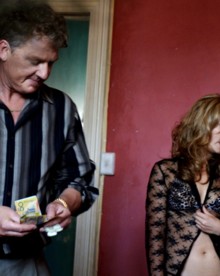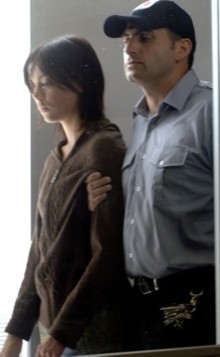The Beginning "When did it all begin?" I asked Sasha.
We were sitting around a table covered with brightly colored teacups and trays of cookies. The small apartment, belonging to our friend Lauran, felt like the haven that it had become: peaceful, gentle, safe. I knew something about Sasha's story from Lauran - that she had been trafficked to Germany and Holland, that she had a young daughter, that she was rescued by a Dutch cab driver who married her, and that she was working hard to get her life back together. I knew that she had been befriended by a Dutch woman in Amsterdam who saw her weeping day after day as mothers waited for their children outside of school, and had introduced her to an ever-expanding circle of compassionate strangers who showed her love, friendship and steadfast commitment during this long and arduous process of emerging from prostitution. When Sasha found out that I would be visiting Lauran, and that I worked for an anti-trafficking organization, she was eager to tell me her story in the hope that it would help someone else.
Her silence lasted a long time. I wondered what event she would choose as the beginning of her story.
"With my mother," Sasha finally replied, and there was no hesitation in her voice. She began talking in a calm, conversational tone, and told me the story of a childhood characterized by abandonment, cruelty and loneliness. Her real father had left the family when she was a child. Sasha hardly remembered him. Her mother, who remarried shortly after, worked as a cleaning lady in dorm buildings for male laborers. She drank extensively, and when she drank, she beat her daughter. Sasha was expected to take care of the house, prepare the meals, clean up after her parents. Every morning her mother would make a list for her and if she did not complete her tasks, her mother would beat her. Sometimes, Sasha was forced to endure other punishments ranging from the irrational to the cruel. On occasion, she would be forced to write, "I will respect my mother," over and over again. At other times, she would be required to kneel on the stone floor, her arms stretched out in front of her, as her mother weighed them down with books. She had to stay that way for an hour and if she dropped her arms, she would be beaten. Her stepfather was a good-enough man, but passive. He was kind to Sasha, but never interfered when she was being punished. He too drank, vodka and rum. Because her mother was frequently too drunk to go to work, Sasha was the one who lied for her, fabricating stories of illness and injury.
Sasha's mother became pregnant. Her labor was long, the baby was born ill, and mother and son were required to stay in the hospital for two weeks, leaving Sasha alone with her stepfather. One night, while her stepfather was out celebrating the birth of his son, Sasha fell asleep in her parents' bed watching television. Her stepfather returned quite drunk and collapsed in bed next to her. He raped her. "He was a decent man," Sasha explains. "Sometimes I think that he was too drunk to know what he was doing. But I knew what happened." She told no one.
As her brother grew, Sasha was required to take care of him as well as the rest of the family - in addition to keeping up with her schoolwork. The mother started to entertain men at home in the afternoons. Their house was tiny - two rooms - and Sasha remembers putting her hands over her brother's ears so that he would not hear what was going on, but she did. One day, her stepfather returned from work early and caught his wife with another man. He took a knife and attacked. Both men were injured, and Sasha's stepfather was sent to jail for two years. Sasha was sad - he had been the only person who had been remotely kind to her, and now he was going to jail.
To escape some of the horror of home, Sasha began to visit her grandmother, who lived in an adjoining town. The walk there and back provided Sasha with time to escape the ugliness of her home life, even though she was frequently under orders from her mother to steal from her grandmother. One day, as she passed through a wooded area, she was attacked by a group of local boys. They took her off the road into the cellar of a house and spent the afternoon raping her. After they left, she went home and said nothing. Her mother found out and called the police. Two of the boys were sons of police officials and were never arrested. The story was quickly forgotten. In a drunken rage, her mother began screaming at her, accusing her of going after the boys, and telling Sasha she regretted the day her daughter has been born. "Take your clothes and get out of my house forever," she screamed. Sasha collected her few possessions and went out in to the night. She was 14, homeless, and had just been gang raped.
For the next four years, Sasha lived with her grandmother on weekends and attended a vocational high school to become a nurse. She moved to Prague, began her professional training as a psychiatric nurse in one of the city's hospitals, and found a boyfriend. He was a nice guy, good company, and Sasha liked spending time with him. She never worried about contraception because she had been told that, after being raped, it was not possible to become pregnant. However the inevitable happened. On May 11 she turned 18; on May 31 she was married, and on July 16, her son was born.
Her husband ran off with another woman and she found herself with a baby to support. For two months, she slept in a cheap hotel and finally in cars. The government child protective services took her son away from her, declaring her unfit as a mother. She finally got a job in a factory and applied for subsidized housing. "If you sleep with me, I will put you at the top of the list," her boss told her. Knowing that a house would enable her to get her child back, she complied. Soon after, she was given her own home. It did not matter that it was tiny, that there was only cold water, and no heat. She had learned the power of her own beauty to get something that she wanted. All that she wanted was a home for her child.
She started keeping company with another young man. Because she was told her first pregnancy was a fluke, she still used no contraception and inevitably became pregnant again. Again, she married, gave birth to a daughter, lived unhappily and divorced. This time, she lost her children, her home and her job. She started working as a waitress at a local restaurant, met a man named Peter and, because he promised her some stability and the likelihood of getting her children back, they married. She was able to get her daughter; her mother had demanded custody of her son. Again, the cycle of domestic violence and emotional abuse repeated itself. Peter lost his job, and Sasha was the only one providing an income for the family. She worked, shopped, and took care of the family. Peter drank, gambled, slept with other women and beat her when she came home. One night, she was so badly hurt she had to be hospitalized. Still, she continued, knowing that without her, her daughter would have nothing.
Sold! Sasha was barely eking out a living for herself and her family. For several months, she also worked in one of Prague's many nightclubs, getting out on the floor as a way to get others to dance. Men told her that she was a good dancer. In the summer of 1996, she was approached by some men who told her that they knew about her hard life. They offered her an opportunity to go to Germany, dance in a restaurant and make some money. She could strip - only if she wanted - to increase her income. Sasha wanted to take her daughter, fearing that her husband would mistreat her, but her new friends said that this would not be possible. Sasha made a deal with her husband, Peter: "I'll go to Germany and make us a lot of money if you will take care of our daughter when I am gone. I promise you, I will give you all the money." He agreed, and she left.
She started to worry when they crossed the German border. The man making all the arrangements, Stefan took her passport and those of the other girls riding in the car in order to clear customs, and kept the documents, "In case we need them for something else," he said by way of explanation. He never returned the documents.
When they arrived in Germany, she and the other girls were taken to an underground apartment and told what their new life would be like. "You will work in the club, you will talk and drink with the customers, encouraging them to buy lots of alcohol and, when they want, you will go to the back rooms and have sex with them."
"I was in shock," Sasha tells me later. I could not realize that this was happening to me." She wanted to leave, and demanded her passport back, but Stefan told her, "You cannot go now. You owe me money. I bought you." I asked her how much she owed, but Stefan never told her. Consequently, she never knew if she was every getting closer to paying off her debt or not. She felt enveloped in a shroud of deep despair. "I saw that I had traded one type of hell for another," she said flatly, describing how she reacted to the news of her enslavement. "I did what I had to do, because I was doing it for my daughter."
Later she was taken to the Netherlands, and located in a window in the red light district of Amsterdam. She was told that she would charge clients 50 guilders (US $20) for twenty minutes. At the end of every night, she would be expected to pay Stefan and his aide, Joseph, 550 guilders (US $200) - the result of 11 clients, plus installment on the exorbitant rent for the apartment they had found for her. Anything after the income from 13 clients was hers to keep. Together we calculated what her traffickers were able to make off of her on one year. Considering that Sasha worked six days a week, in one year she paid her traffickers the equivalent of $70,000 - tax-free. Sasha was appalled. "All that money, and I have nothing for myself,' she kept saying. When she said she wanted her daughter, Stefan said that she would have to pay 10,000 guilders (US $4,000) to get her. Sasha had no choice but to work more. I asked her, what was the most she had ever worked. She closed her eyes and thought. Telling me an amount of money, she asked, "How many clients would that make?" I did the math and looked at her, hardly able to believe what she was telling me. "You were sometimes with 36 clients in one day?" I asked her, and she said, "Yes. I had to. I wanted my daughter back." She described how she coped. She drank a lot. Every night. And after each client left, she showered to wash the feeling off of her body. She disassociated herself from what she was doing, much as she had done when she was in the Czech Republic and was repeatedly being beaten by her husbands. She became numb, feeling nothing. "I kept reminding myself, it is for my daughter. That is how I got by."
"Were you not free to go?" I asked her. "There was always a security guard out side the street," she said. He walked back and forth. Stefan said that she was there to protect Sasha, but Sasha did not have a cell phone or any way of getting in contact with him if a client were to become abusive. He was there for one reason: to make sure that Sasha and the other girls Stefan was managing stayed right where they were. Stefan also threatened her daughter. Her life consisted of caring for her daughter and going to work. All of her movements were watched. She was not going anywhere.
RescueAmsterdam's red-light district needs no description. Customers blend in with curious pedestrians; others are brought there by cab drivers that drop off their fares and drive around the streets waiting to take the man back to his home or hotel. As good businessmen, these drivers became familiar with the women behind the windows, making mental notes of their different characteristics so as to provide their fares with what they wanted. Mihiel was one such cab driver. He noticed Sasha soon after she got there. She was tall and strong, with wavy blond hair and deep blue eyes. But something else caught Mihiel's attention. "It was more of a sense that she didn't belong there," he told me. He decided he wanted to get to know this woman so he walked into her room, put down his money and said, "I just want to talk to you." Sasha was stunned. This had never happened to her before. "Who are you?" he wanted to know. "Where do you come from?" Slowly, and in spite of herself, Sasha came to trust this big but gentle man who genuinely seemed to care about her. Mihiel was falling in love with her. Sasha tells me that she spent the first months of their relationship trying to push him away. "By that time, I believed that I could never trust another man again. Men had beaten me, raped me, abused my children and me, and sold me into slavery. Why should I trust another man?" But Mihiel was undaunted. One evening, as he was standing around a street corner talking with other cab drivers between fares, he noticed a few flower vendors on the corner. "How much for all of your roses?" he asked them, knowing full well that they were not cheap. He piled the bushels of roses into his car and drove to the red light district. "Every half hour I would stop at Sasha's window and take in a rose." Sasha still seems incredulous in the retelling of the story. "He never said anything, he just came in, put the rose on a table, and left. Later the next morning, I went home. When I opened the front door to my apartment building, I noticed that there were roses on the stairs leading up to my apartment. There were roses in front of my door. I entered, and the apartment was completely filled with roses - in the kitchen sink, inside the refrigerator, on the bed and in the closets. There were even roses in the toilet!" He had broken in during her absence and covered the place with flowers.
Eventually Mihiel's gentle persistence paid off and she began to think that she could have a relationship with this man. She had never hid her past from Mihiel, nor her slave status. And he was determined that he could do something about this. Mihiel, the son of a well-known Dutch television celebrity who had been disowned by his father when he was a young boy, was very familiar with the ways of the streets and with Amsterdam's shadow sector. One night he took a few of his own associates and met with Stefan. The deal, simply put, was Sasha's full release from any from of debt bondage and slavery as well as the return of her passport. In exchange, Mihiel assured Stefan that he would not be harmed. The one stipulation Stefan asked for was that his name not be revealed to the authorities.
To this day, Sasha divides her life into two parts - "Before and after I got my freedom."
The Long Road BackSasha and her daughter Denisa have lived with Mihiel for six years. Overstuffed photo albums document the development of family life - birthdays, Christmas, new clothes, and finally, Mihiel and Sasha's wedding after their respective divorces became final. For several years, Mihiel has supported Sasha and Denisa, as well as providing support to three daughters from an earlier marriage, on his taxi driver salary. Paying taxes as a single man with no dependents, he has also had to pay for medical bills, school, and other expenses out of his own pocket. Now that she is legally married to Mihiel, Sasha has applied for resident status but the Dutch government has issued an extensive list of requirements that must be met first. Because her status is that of an illegal alien, she must leave the Netherlands until her status is regularized, and her family is once more separated. In her efforts to normalize her status and provide long-term stability to her daughter, she feels as if she is being punished.
On one of her trips back to the Czech Republic, she sought refuge and help in a shelter run by a non-profit organization located in numerous Eastern European and former Soviet countries with a mandate to assist victims of trafficking. It was an experience she never wants to repeat. The "shelter" was located out of the center of the city. It was an empty apartment with minimal furniture, no television, and no phone. A paid social worker was on duty until three in the afternoon every day but after that, went home. At first, Sasha was in the home by herself, soon to be joined by three women from other former Eastern Block countries. They were all there in a strange city, with nothing to do, no telephone, and no one to speak to. "We can't get too involved with our clients, we would lose our objectivity," commented a worker from this








